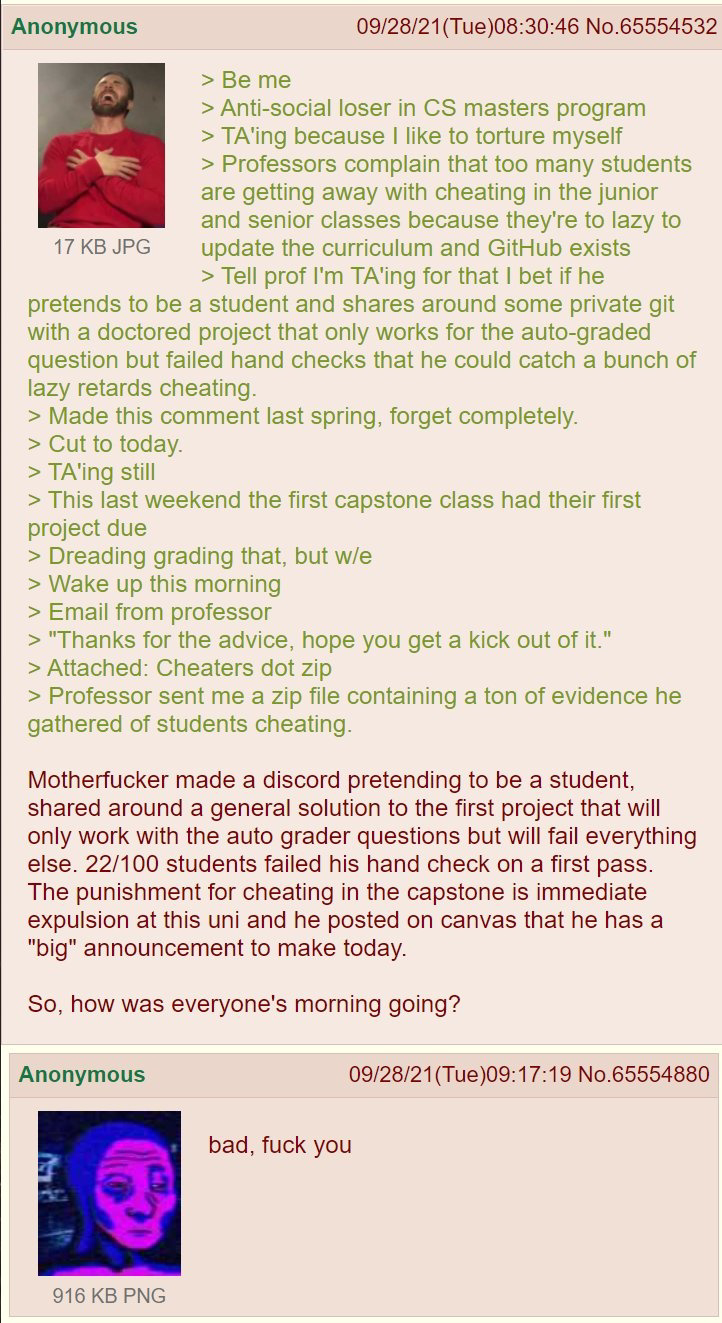this post was submitted on 06 Feb 2024
1127 points (98.1% liked)
Greentext
6232 readers
427 users here now
This is a place to share greentexts and witness the confounding life of Anon. If you're new to the Greentext community, think of it as a sort of zoo with Anon as the main attraction.
Be warned:
- Anon is often crazy.
- Anon is often depressed.
- Anon frequently shares thoughts that are immature, offensive, or incomprehensible.
If you find yourself getting angry (or god forbid, agreeing) with something Anon has said, you might be doing it wrong.
founded 2 years ago
MODERATORS
you are viewing a single comment's thread
view the rest of the comments
view the rest of the comments

Their teachable moment is that plagiarism has consequences, and they earned that lesson entirely by themselves.
Sure, but as a general rule the carrot is a better incentive than the stick.
Let's not pretend these are kids who have a test for their first time. They all were told to not cheat and that cheating would lead to expulsion.
I refuse to feel bad knowing that chances are they have been given an opportunity that many others would never get.
They made their choice, but then rehabilitation should be the goal rather than cutting their hands off. Not that there's not a time and place for cutting hands though.
This would be to mitigate societal loss rather than exert immediate justice, so the ones who are able and willing to change have the option.
On the flip side, all threat of consequences works as a deterrent only when there's the expectation to be caught and punished.
By always catching but never handing out punishment to kids violating rules, you only teach them that consequences are inconsequential.
To clarify, I wasn't trying to argue there shouldn't be consequences, just that depending on severity it must be proportional.
I want to compare it to the US justice system where, from an outsiders perspective, many are judged unnecessarily harsh. This makes it harder for people to "come back" after release and creates a societal loss.
I'll end it there because I cba to write more but, eh, just my thoughts. Some nuance is lost in translation too.
Your thoughts are valid and I agree – in principle.
The proportionate punishment does, however, depend on the severity of the violation. In an academic context, there are few things as severe as blatant plagiarism. Being caught in not just cheating but brazenly copy-pasting other people's work can imho be appropriately punished with expulsion, be it in the US or elsewhere.
Expulsion is honestly not a harsh punishment in that case
Yes, the punishment for plagiarism is kinda standardised. I feel like maybe, at first strike there should be a warning + redo the assignment. But the specifics would be a whole new never-ending discussion
I've always only heard it's punishable directly with explosion. Maybe it's for there for a reason, or is it a remnant of the past?
As a general rule, the stick is better than the carrot when teaching someone what not to do. But this guy's goal isn't to teach them "cheating is bad" but to weed out dishonest people too stupid to program.
Your flaw is thinking people believe there is a carrot at the end. I have no idea how these generations will get through and they all feel it.
What's the carrot for being honest then?
A CS degree
?? When the cheaters are simply waved through the courses as well, some of them will definitely achieve a CS degree as well. They will simply have put in less work and be less well educated.
But in my experience people who cheat do so repeatedly, in multiple courses, their bachelor thesis, in exams when there is a way, ...
You're right, every task should be made so that you can take information from anywhere and learn it, but have to apply it in a certain way. Then there's the cases where people let others do their work for them. Every task should be automatically looked through to match, so that cheating can be gotten every time or at least as often as possible.
This is in a perfect scenario imo though, and with LLMs things will get more obfuscate than before.
those programmers understand the underlying code.
This is about students PROVING they understand the underlying theory. Letting them copy destroys that.
As a software developer I'm expected to, at the very least, to do two things when "plagiarizing":
When students plagiarize, they don't even need to do that. The solution they are copying from was written for the exact same assignment, so they don't need the adjust anything (at most, they change some identifiers to throw off plagiarism detectors). And they copy from each other, so they don't need to search for a solution. They may need to apply some social skills to find out who to copy from - but these are vastly different from the technical skills required to find relevant code to "plagiarize" in real world programming.
If you can find it on GitHub and Stack Exchange, it's not plagiarism